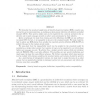Free Online Productivity Tools
i2Speak
i2Symbol
i2OCR
iTex2Img
iWeb2Print
iWeb2Shot
i2Type
iPdf2Split
iPdf2Merge
i2Bopomofo
i2Arabic
i2Style
i2Image
i2PDF
iLatex2Rtf
Sci2ools
ASIACRYPT
2015
Springer
2015
Springer
Idealizing Identity-Based Encryption
We formalize the standard application of identity-based encryption (IBE), namely noninteractive secure communication, as realizing an ideal system which we call delivery controlled channel (DCC). This system allows users to be registered (by a central authority) for an identity and to send messages securely to other users only known by their identity. Quite surprisingly, we show that existing security definitions for IBE are not sufficient to realize DCC. In fact, it is impossible to do so in the standard model. We show, however, how to adjust any IBE scheme that satisfies the standard security definition IND-ID-CPA to achieve this goal in the random oracle model. We also show that the impossibility result can be avoided in the standard model by considering a weaker ideal system that requires all users to be registered in an initial phase before any messages are sent. To achieve this, a weaker security notion, which we introduce and call IND-ID1-CPA, is actually sufficient. This ju...
Related Content
| Added | 16 Apr 2016 |
| Updated | 16 Apr 2016 |
| Type | Journal |
| Year | 2015 |
| Where | ASIACRYPT |
| Authors | Dennis Hofheinz, Christian Matt 0002, Ueli Maurer |
Comments (0)

